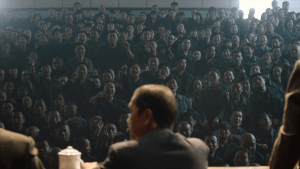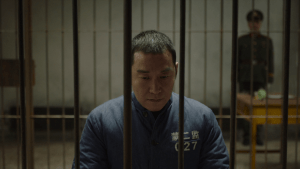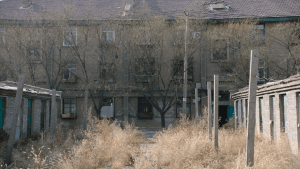By Thomas Chen
MCLC Resource Center Publication (Copyright February 2024)
Wang Xiaoshuai’s 王小帅 So Long, My Son (地久天长; 2019), now available to stream for the first time in the U.S. on Mubi, is a tour de force of epic proportions. Ostensibly about the human costs of China’s one-child policy, which was implemented around 1980 to curb population growth, the story of the 185-minute film spans over thirty years from the early 1980s to the 2010s and is centered around two families. Liyun and Yaojun—played by Yong Mei 咏梅 and Wang Jingchun 王景春, respectively, in Silver Bear-winning roles—are factory workers in a fictionalized city in the northern province of Inner Mongolia. They are close friends with Haiyan and Yingming, the former the supervisor of family planning at the same factory. Liyun and Yaojun lose their son, Xingxing, in a drowning accident involving Haiyan and Yingming’s son, Haohao. In the aftermath of the tragedy, Liyun and Yaojun flee and eventually settle along the coast of Fujian province in the south. The film’s nonlinear narrative crisscrosses the three decades and two locales.
So Long, My Son is Wang Xiaoshuai’s twelfth fictional feature. Born in 1966, the year the Cultural Revolution began, Wang is frequently dubbed a member of Chinese cinema’s “Sixth Generation” that started making films in the 1990s outside the state studio system. Like others of his “generation,” most notably Jia Zhangke 贾樟柯, he eventually reentered the system, his films screened by censors in order to be then screened in theaters. Not coincidentally, Wang first conceived So Long, My Son in 2015, when the one-child policy—replaced by a two-child policy—effectively ended. Although popular films such as Dearest (親愛的; 2014, d. Peter Chan 陳可辛) and Wrath of Silence (暴裂无声; 2017, d. Xin Yukun 忻钰坤) have dealt with the loss of the only child, Wang’s is the first film widely released in China to broach the policy explicitly.
Translated as So Long, My Son for international distribution, the title in Chinese (地久天长) means “everlasting.” It stems from the song “Friendship Everlasting,” the Chinese version of “Auld Lang Syne.” Released in China a month after its Berlin premiere, the movie was ten minutes shorter. What is more, the difference consists not in mere cutting. Between the international and domestic versions lie four significant discrepancies. These discrepancies reveal the crux of the film, which hinges less on the one-child policy than on the general nature of Communist Party rule.
In the first of the four discrepancies, Yaojun is playing “Friendship Everlasting” on a harmonica in the factory break room when Yingming shows up and urgently calls him over. The two return to the workers’ dormitory where they inform their wives in hushed tones that their friend Xinjian got arrested at a dance party. Because of the “strike hard” (严厉打击) campaign, Xinjian was charged with incitement to debauchery, a crime that could lead to execution.
The “strike hard” of 1983 Yingming refers to is given more sonic background in the film’s international version. While Yaojun plays the harmonica, a radio in the break room broadcasts the news, announcing a three-year anti-crime campaign—with instructions from paramount leader Deng Xiaoping—during which punishment will be fast and severe. In the domestic version, the radio announcement is inaudible.
Whereas this first discrepancy manifests in sound mixing, the other three concern editing. In the second case, Liyun and Yaojun are in a hospital—the same hospital where later in the story their son will be pronounced dead. As family planning supervisor, Haiyan turns Liyun, caught pregnant with a second child, over to the doctor. Haiyan explains that “thought work has worked,” meaning Liyun has acknowledged the mistake of concealing her pregnancy when she already had a child. While Yaojun is later waiting in the hallway, a nurse bursts out of the operating room calling for the doctor: Liyun is hemorrhaging. Yaojun enters the OR but is pushed back out, so only one of his eyes can peek through the slit between the doors (fig. 1).
In the domestic version, this shot of Yaojun’s peeking eye cuts to a hospital room later in the day. Liyun is in bed, Yaojun at her side. She apologizes to her husband, presumably because her fainting led to Haiyan’s discovery of her condition and the loss of the fetus. Yaojun comforts her.
This scene is replaced in the international version with an entirely different one. With Yaojun’s eye peeking through the doors, the film cuts to a scene later in the year. The ensuing shot is suffused with red: schoolchildren with cheeks daubed red, wearing the red kerchiefs of the Young Pioneers, singing a “red” song—the Young Pioneers’ anthem, “We Are the Successors of Communism”—on a red stage framed by red flags (fig. 2). This editing is a not-so-subtle implication of the Communist regime in the spilling of Liyun’s blood and the killing of her unborn second child. In an ingenious series of shot-reverse shots, Yaojun’s eyes are now closed (fig. 3). He is seated next to Liyun in the audience of the factory auditorium, a big, red, fake bouquet hanging on his chest. A gesture of resistance, he has dozed off during the pupils’ performance.
The performance is part of a ceremony at which Haiyan presents Liyun and Yaojun with the “Family Planning Model” award. They are invited onstage and receive certificates, but they aren’t exactly thrilled. In a shot of their backs, Haiyan whispers into Liyun’s ear that the award comes with a bonus and then says “Give me a smile.” Only then does a frontal shot show strained smiles on the couple’s faces, the certificate reading the year 1986.
The third discrepancy takes place in the same auditorium. The occasion is the announcement of factory layoffs, which places this scene in the mid-1990s. The factory director on stage, however, doesn’t get to the point right away. He first conducts “thought work.” Before a packed hall of workers in blue uniforms, the director, armed with a microphone and flanked by deputies, frames the downsizing as an “opportunity and choice.” He next embarks on a string of highfalutin phrases drawn from the Chinese cultural canon, reciting famous lines of verse and prose from dynasties past, such as “Even a commoner bears responsibility for the rise and fall of all under heaven.” In the domestic version, he then firmly declares that the present is a market economy, industry is restructuring, and there are no more “iron rice bowls.” Workers have to find their own employment. He proceeds to read aloud from the layoff list, which includes Liyun’s name. Standing in the back of the auditorium, Liyun holds back tears before turning away.
The irony is even starker in the international version, where the director urges those to be axed to continue to “add bricks and tiles to socialist construction.” What most distinguishes this version, however, is that the workers talk back. Unlike the domestic version, they do not sit quiescently while their vocations are stripped from them. When the director intones that the nation is facing difficulties and can no longer afford to carry so much burden, a voice from the audience yells: “I have difficulties too—who’s going to help me?” The director sounds the call of duty, comparing the workforce to soldiers who need to take up arms to save the country: “‘The enemy is before us, its soldiers pressed against our borders.’ What will our soldiers do?” “What are we to do?” comes the reply from the workers. They are not impressed by his rhetorical flourishes, interrupting him with hisses, telling him, essentially, to cut the crap. When the manager again speaks of sacrifice, someone hollers: “You lead the way!” Heard also are: “Have your own children step down” and “You step down!” Finally, despite these protestations, the director begins to read aloud from the roster of layoffs. Upon hearing the first name, the workers roar in varied unison, eventually surge onto the stage, and tussle with the director and his deputies (fig. 4). One worker even seizes the layoff roster, waving it to the crowd while chanting: “I won’t be laid off! I won’t be laid off!” She may speak in the first person singular, but the scene stages a collective uprising. These workers—the former vanguard of the revolution—do not submit meekly to the revisionist takeover; though uniform in attire, they refuse to be “blue ants,” mass ornaments in the display of obedient unity.
The dismantling of the edifices of socialism, however, was not to be checked. The fourth and final discrepancy occurs later in the film during the 2010s. Liyun and Yaojun, whom the dying Haiyan wanted to see one final time, are back in Inner Mongolia for a visit. Haohao, Haiyan and Yingming’s son, now in his 30s and a doctor, is driving Liyun and Yaojun back to their old home after his mother’s funeral. Along the way he points out the city’s ghostly landmarks, including the “former May Day Square”—implying that this space honoring the laboring classes has been repurposed in the current era—and the demolished factory auditorium. Liyun is shocked by the change. “Not a shadow left,” she mutters to herself. Here the shot of the backseat pans slowly from her on the left to Yaojun on the right. Her words are no happenstance, for when the shot reaches her husband, he is caught off-guard by a sight outside his window. The succeeding point-of-view shot shows a statue of Mao Zedong pass by the moving vehicle, his white-marble figure in immobile salute in front of a shopping plaza plastered with advertising (fig. 5). Yaojun returns the raised hand in the car. This cameo by Mao appears only in the international version.
Why is it excised from the domestic version? Perhaps for the same reason that the mention of Deng Xiaoping in the radio broadcast about the “strike hard” campaign was muffled: the names and images of state leaders, unless reverentially rendered, are untouchable. Or perhaps because Mao has no place in the China of today, as suggested by the incongruity of his statue before an electronic billboard promoting a Thanksgiving sale. So Long, My Son is set strictly in the post-Mao period. Its central characters are not intellectuals, as was often the case in Chinese “scar” literature and cinema of the 1980s and beyond that reflected on the traumas of the Cultural Revolution. Who is scarred in Wang Xiaoshuai’s film? Primarily the worker, but also the Party cadre: as a functionary tasked with carrying out directives at all costs at the grassroots level, Haiyan pays a price too. In the aftermath of the death of Liyun and Yaojun’s son, Xingxing, she is tormented with guilt, despite repeated exhortations from friends and family that she’s not to blame for her role in Liyun and Yaojun’s bereavement: she was doing her job.
Who’s to blame, then, for their bereavement, as well as for the tens of millions of state-owned enterprise employees discarded in the restructuring? The one-child policy and the evisceration of the socialist welfare system are not Maoist legacies, but the shadow of Mao looms over So Long, My Son. The same form of political rule instituted in 1949 persisted into the thirty-plus-year span covered in the film. The discrepancies between the domestic and international versions demonstrate that coercion, not persuasion—despite all manner of euphemisms—has always been the modus operandi of the regime. In Mao’s days, the shock therapy may have been instantiated, for instance, in the Great Leap Forward that was to launch China beyond the economic orbits of the U.K. and the U.S. In Deng’s days, it took the forms of the privatization push, the one-child policy, and the “strike hard” campaign, among others. Justifications have never been lacking: a bloated state sector, population management, clamping down on crime. But the common denominator is the “people’s government” riding roughshod over the people it claims to represent.
A scene present in both the domestic and international versions is revealing in this regard. Liyun and Yaojun, Haiyan and Yingming, and Xinjian’s girlfriend, Meiyu, visit Xinjian in prison. The formerly flamboyant, trendy Xinjian—who once danced with Meiyu to the Boney M. cover of “Rivers of Babylon” in bellbottoms—now appears in a blue jumpsuit, his head of wavy hair shaven (fig. 6). Separated from his friends by prison bars, his sits down and utters sheepishly, without being prompted: “The government is lenient with me, no mistreatment.” Again, when the two couples leave and only Meiyu is left, she tells him to say something. Xinjian replies: “I will cooperate with the government, reform myself well.”
It is evident that the government’s treatment has cowed him. “Thought work” may not have succeeded with the workers in the auditorium, who storm the stage. Or with Liyun and Yaojun. After Haiyan catches the pregnant Liyun, Yaojun tries to take his wife away, but Haiyan blocks their way and soon other personnel arrive on the scene. During a brief physical struggle when one of the men pins Yaojun against the wall, Liyun is escorted away. Powerless to stop the kidnapping, Yaojun bangs his head and fist against the wall. He then acquiesces and jumps aboard the vehicle taking his wife to the hospital. As the couple rides in silence, Liyun caresses Yaojun’s bloodied knuckles.
Thought work, however, does work on Xinjian, not because it was compelling, but because of compulsion, here personified by a prison guard in the background. The regime has the capacity to strike as hard as it wants. If conversation doesn’t convince, then violence or the threat of violence certainly does.
Resistance is futile. You will lose your second child. You will, after a lifetime of contributing to socialism, be abandoned by socialism (and still be called on to contribute to it). The “worker-owned” factory will slough off the workers. Just as Xinjian has to “cooperate” by having his head shaved and “reforming” the self that “incited debauchery,” so the Chinese people can only “cooperate” and “reform”—by accepting forced abortion with a smile, by “plunging into the sea” of capitalist enterprise.
So what is “everlasting” in So Long, My Son? It could be pain and regret: of Liyun and Yaojun, of Haiyan, of all those whom the one-child policy, though now past, continues to haunt. Or it could indeed be friendship, as the two families, torn apart by tragedy, are reunited in the end. When Liyun, Yaojun, and Haohao arrive at the old couple’s home, the young doctor asks if he can come up. In their room, he will unburden to them a secret he has harbored all these years: his role in Xingxing’s death.
But before they reach that room, they first pass in front of the dormitory, one of the few workers’ dorms not (yet) demolished. On the building, in white outline, are the remnants of the word for “people” (fig. 7). Its top half erased with time, the word is barely visible above the overgrown grass. Its fading, too, is a kind of farewell, a hand raised not in perpetual salute but in parting.
Thomas Chen
Lehigh University







